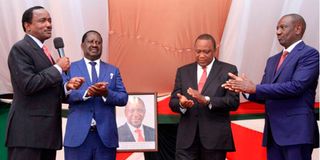Leadership is serious business

President Uhuru Kenyatta (second right) and Deputy President William Ruto (right) with Wiper party leader Kalonzo Musyoka (left) and ODM leader Raila Odinga when they promised to work together during 16th Annual National Prayer Breakfast at Safari Park hotel in Nairobi on May 31, 2018.
What you need to know:
- Hatred and the threat of ethnic, possibly even civil war, are ever present dangers in Kenyan elections.
- A democratic governance system should support change of government in an environment of peace and stability.
Tanzania is a very interesting country. It has some of the highest political consciousness of any country in Africa. The people love their country; they are truly patriotic. They always talk about what is good for the country, what is good for the name of the country, and so on.
All this did not happen by mistake. For many years, they have had real, good, patriotic leadership. And the dominant party, Chama Cha Mapinduzi (CCM), has been an effective trainer of leaders and citizens on nationalism and other good values. The leaders have set good examples. CCM has been a custodian of the national interest.
It was not unusual for a powerful leader to live a modest life in a small house in Mikocheni and drive one or two cars. I think some of the leaders today are developing an appetite for private choppers and apartments in Dubai, but these are the minority, I think. Not to say there is no corruption in Tanzania; far from it.
There is true, widespread cohesion. And not to say that some leaders do not try to exploit nationalism to create dictatorial conditions. Sometimes they do. And not to say that there aren’t sometimes sectarian, even ethnic, tendencies. I think there is a couple of tribalists around.
And sometimes it feels as if Tanzania is trapped in amber circa 1990: Constitutional practice that is deaf to civil and political rights, unfettered state power, suspicious elections and so on. Still, the polity is relatively stable and nationalism deeper, and more developed, than here.
Wrong type of people
Hatred — personal and communal — and the threat of ethnic, possibly even civil war, are ever present dangers in Kenyan elections. I have always asked myself why this is the case. A democratic governance system, one supported by well-functioning institutions, should support matter-of-fact change of government in an environment of peace and stability. The question is why? Why is it like this? Why are we like this?
First, our leaders are untrained, ignorant and do not have intellectual guardrails to guide their political conduct. There are no expectations and no organised attempt at holding them to account for what they do. A Kenyan politician is a king, a power unto himself. You can kill citizens, plunder the country, even rape its women and conduct yourself in the most ghastly manner. There are good odds that the only thing you will get is the reward of public office and unfettered access to taxes.
There are many who do not know how a democracy works and what the role of the leader is. You come straight from running wash-wash scams and into Parliament. What’s to stop you from taking Parliament as just another wash-wash scam?
Leadership in Kenya attracts the wrong type of people. In many places, a person who is in a hurry to get into office, or is exceedingly greedy for office, is gently blocked. The more reluctant and controlled ones get a through pass. The impatient ones create a desperation around politics and an assumption that, if I don’t get it, my life is over. One would have thought that it is everyone’s interest to create a situation where the loser is free to continue with his life peacefully out office.
Secondly, there are career politicians in Kenya but I wonder whether there are professional ones. A professional politician is trained and understands the roles he is seeking. There is a separation between the public and the private. Politics is not personal; it is a job, albeit one driven by strong convictions. As a result of our confused political culture, people take offence; they plan and execute revenge, sometimes using state power and resources.
Unreasoned candidates
In a sensible environment, there is clear separation between politics on the one hand and the economy and administrative state on the other. The politicians are in charge, and they have power, but that power is checked by public servants who are trained and experienced at controlling the excesses of the political class. And the politicians make economic decisions, but there is a bureaucracy to execute those decisions and to prevent abuse.
Finally, we have what I can only call unreasoned candidates. They are not only untrained; they are also largely unvetted. The process is a joke. I saw that in Tanzania. Candidates for office are sieved like posho: They are cleared by the intelligence services and CCM’s executive and central committees. If you are defective, in a hurry, extremely greedy, vindictive, a traitor, a CIA agent, exceedingly greedy or rabid tribalist, the party will tell you to get lost.
There should be deeper, more thorough clearance of leaders in our elections. The power of the courts to adjudicate and stop everything, especially in circumstances where the impartiality of the court is sometimes at issue, should be judiciously limited. People can live their lives however they want but they should not expect to lead the rest of us.
There must qualifications, including genuine ethical expectations, which are equitably and justly enforced without the possibility of man who is facing 10 criminal cases rushing before a friendly judge to get cleansed and, thus, declared fit to run.
Happy nominations and blessed holidays and fasting.





